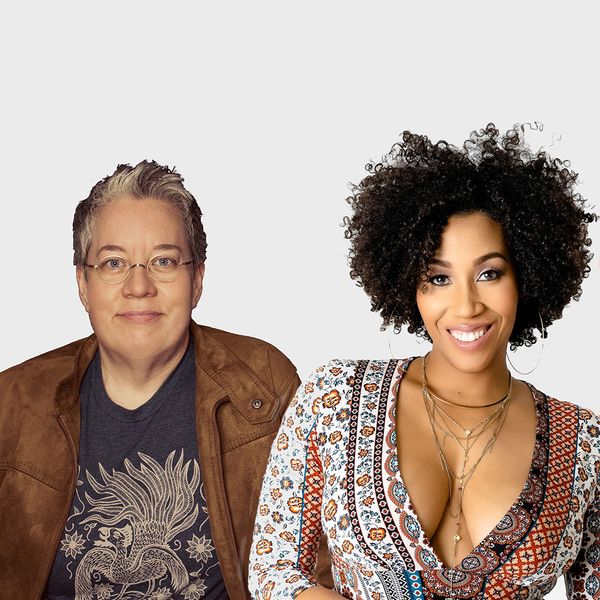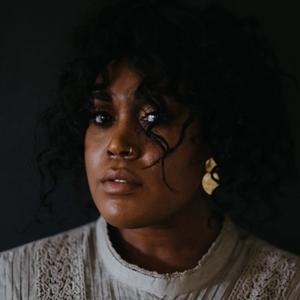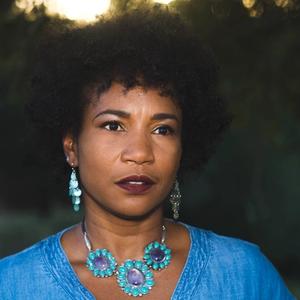




Link copied

When Holler asked me to interview Rissi Palmer about the beautifully non-stop career ascension she is currently enjoying, I told them it wouldn’t be a typical interview between a journalist and an artist. It would lack objectivity because, at this point, our fates are pretty tightly bound, Rissi’s and mine.
Not only are we good friends, but we are colleagues at Apple Music Country - each with our own show. We’re also co-conspirators, founding a pair of grant funds that support marginalized artists in roots and country music. So, when I told Rissi that Holler gave me this assignment, asking for a no-holds-barred conversation between two friends pushing to diversify country and Americana, she said, “You could just publish one of our text threads.” She wasn’t wrong, but that would have had a bunch of emojis, gifs, and shorthand references. Instead, we took the time to use our words and speak our truths, because this community is at an absolute crossroads right now. It can either shake loose from its deeply racist past, make long overdue amends and embrace a wonderfully diverse future, or it can cling to Confederate flags, continue in its cultural appropriation and ignore racist slurs.
I’d rather be on (and by) the side of someone pushing for equity and justice through everything she does. Though that activism wasn’t necessarily apparent on her 2007 self-titled debut, the album landed three singles on the country charts, making her the first Black woman in 20 years to do so. While Nashville still refused to embrace her fully, legal wrangling kept her bound up for far longer than she would’ve liked. Once she broke free and returned in 2019 with Revival, Rissi had a much clearer idea of who she was and what she wanted. That clarity has only grown crisper since, as evidenced in her wonderful show on Apple Music Country, a new exhibit at the Country Music Hall of Fame, a commentator gig on CMT, and an incredibly bright horizon.

Let’s set the stage for everyone: a year ago, you were playing shows around North Carolina and preparing a little side project podcast called Color Me Country. When the pandemic hit, it canceled those performances, and I tipped off Apple Music about you. Now, you’re in a museum exhibit, on the morning news, and just returned to the Grand Ole Opry stage after 13 years. Here is where I quote you; “girl, what in the world is happening?!”
Really, this is all your fault [Laughs]. It was a nice little shower, then a hurricane, and now it’s an earthquake and volcano. You came in, all unassuming, and said, “My friends are going to email you”. Everything went from there. I’ve always dreamed about this; it’s the job that I have been preparing for all my life that I didn’t know would come my way.
Now here you are. I’ve gotta say, your set at the Opry was brilliant, not just because you sounded and looked great, but with those three songs, you stared them right in the eye. You did not blink. Tell me about that.
I think I’m getting a chance to revisit a lot of this because I’m incredibly intentional now. We thought about everything— even down to the color of the dress that I wore. There’s a reason for everything. I knew that if I had this opportunity - and there was a possibility it would be another 13 years before I got to do it again - I had to use it to show everybody who I am now. I'm not that young girl that’s just going to sing ‘Country Girl’ for you, be cute and wear her little dress. There’s an intention and there’s meaning, and I’m going to give it to you. That’s what I’m on right now; activism is a part of it.
It was part of it then, too; you just didn’t know it.
Yeah, acknowledgement is a big thing. So, when I leave the stage, you’re going to know who I am, what I believe, who Linda Martell is, and you’re going to learn some history. As soon as they told me I had three songs, I knew right off the bat what they were.
With all the opportunities suddenly opening up for you, Mickey Guyton, Breland, and others, it’s hard not to be suspicious. Did both The Opry’s invitation and the Hall of Fame exhibit feel genuine rather than performative?
I didn’t feel like either invitation was performative. The Country Music Hall of Fame was genuine; I appreciate the work they’re trying to do there. They’re working very hard to be inclusive in history, and it’s evident in the exhibits. It’s apparent in a lot of the work they’re doing behind the scenes, which the public isn’t even aware of yet. So, no, I have no doubt they are very intentional about what they’re doing.
I was looking at the lineups that the Grand Ole Opry has for the next few weeks, and again, I know some stuff that the public doesn’t know, so I think they’re very intentional. It’s small steps, but they’re very significant.
Good. You and I have talked before about how we’re okay being tokenized if that’s the first step towards real inclusion. We know that, once we get in the door, we’re going to hold it open for our friends to flood on in. If we stick together — BIPOC with queer and disabled folks — making sure we are all always at the table, then we are undeniable. I am so grateful to Apple Music for letting us both do that with our shows because we are changing people’s lives. I will also bring Hunter Kelly in here with us, with [his Apple Music Country show] Proud. Talk to me about the table we’re building over there.
Yes! I’m at the point where they should just tattoo the Apple logo on my forehead; I cannot say enough good things about what they’re doing at Apple Music right now. It’s no mistake on the station that at the helm of five shows are people of color. With yours and Hunter’s shows as well, it’s one of the most inclusive things that I’ve ever seen in and to come from Nashville, and country music, in a long time. When you work intentionally, I think it shows what you’re able to accomplish, what you can get and what you can make room for, if you just put in the effort.
When I see people being intentional, a principle I keep going back to is something I heard [author and activist] Dr Ibram X. Kendi discuss. Either you are actively working for anti-racism or passively enabling racism. There is no neutral in this. So, are all the folks in country music who did not condemn, as you like to call it, “the n-word heard around the world” passively enabling racism?
Yeah. I say this, and I’m going to keep saying it: I think the industry has done a good job trying to show that they want to be inclusive. I’d give it a B-. There were reactions that I wouldn’t have expected. There are also institutions that I know of personally that are working on rectifying a lot of this damage. However, that culture? It's toxic. Shoot, Morgan Wallen even told the people to stop defending him and let things run their course. The culture is toxic, and some people are actively buying it because he said it. That needs to be dealt with, that needs to be openly condemned. If anybody wants to know why people of color and LGBTQ+ people feel like they can’t come to a country show and feel safe, or why they don’t feel comfortable blasting it out of their cars when they’re driving, that’s why. That’s what everybody needs to focus on next - the changing of the culture.
”I have to look out for my brothers and sisters who are darker than me and may not have had the same opportunities because of that. Everybody’s got a privilege at some point, someplace”
So, I have come to understand that white people have an absolute moral imperative to speak up, inform other white people, and uplift BIPOC people at any chance we get. That’s the only way we get to equity, which is different from equality, which some people might not understand. We have to level the playing field by building equity for those at the bottom; that's where reparations or “grants”, as we like to call them, come into the conversation. Let’s discuss what we’re up to there.
Well, first, I want to say this before we get into that: uplifting everybody is all our work. I recognize that, as a light-skinned Black woman, I have a palatable look that a lot of people find pleasant and non-threatening. So, I have to look out for my brothers and sisters who are darker than me and may not have had the same opportunities because of that. Everybody’s got a privilege at some point, someplace.
Between us, we are covering BIPOC, LGBTQ+ and disabled artists in roots - marginalized people, basically - with Rainey Day [the pair’s Grant Fund]. Color Me Country, meanwhile, is reaching out to artists of color who are pursuing country music. We’re trying to make sure that money isn’t the reason why you can't create and exist in these spaces.
Let’s keep it going because that’s the work. We both made this point to someone on Instagram the other day - BIPOC and queer folk want to be part of Americana and country music as audience members, but they’re not going to be until they see themselves reflected on the stage. So, in doing the work we’re doing to get more diverse faces on those stages, we're aiming to change the audience. But we need some help with toxic culture. That’s where these institutions need to step up - that’s considerably more work than you and I can do.
100 percent. Honestly, that’s not just country music - there isn’t a monopoly on that. Unfortunately, this toxic mess is one of our American imports and exports. This excess of, “we don’t want to have a nuanced conversation about anything”, is horrifying. We like to cling to the buzz words. If I hear “cancel culture” one more time, I think I’m going to jump off my porch. I can think of people that have been canceled. I can think of immigrant children that have been canceled. I can think of Muslim people that haven’t been allowed in our country that have been canceled. I can think of civil rights leaders who have been canceled - like, effectively done. You go cry in your corner and count your money and be quiet until everybody has forgotten what you did. Don’t call it cancel culture and shut up. There are consequences. It’s either consequence culture or course-correcting, because we shouldn’t have been doing that dumb stuff in the first place.
Rissi Palmer's latest album, Revival, is out now.
You can listen and subscribe to Rissi's Apple Music Country radio show, Color Me Country, here. You can also listen to Kelly's Apple Music radio show, Record Bin Radio, here.
Rainey Day Fund assists BIPOC, LGBTQ+, and disabled artists, as well as others who add to the rich fabric of roots music. If you would like to learn more, or donate to the cause, head here.





